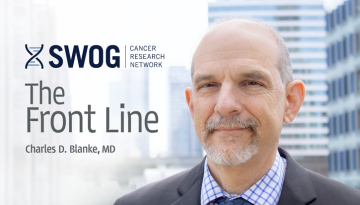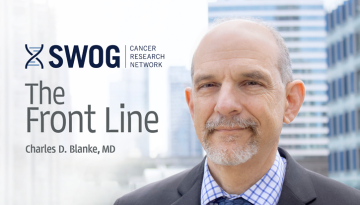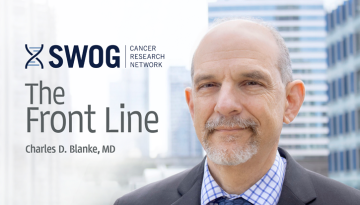S2302 Pragmatica-Lung Reports Out at ASCO
We opened the S2302 Pragmatica-Lung trial in March of 2023 to get a phase 3 answer to a question raised by phase 2 results from the S1800A Lung-MAP sub-study: does a ramucirumab plus pembrolizumab combination improve survival for people with advanced non-small cell lung cancer versus current standard treatments?
S2302 results are in, indicating that the answer to that specific question is no, this investigational combination does not significantly improve overall survival (OS) for all patients. But as was clear from the content of two rapid oral abstract presentations at the ASCO 2025 Annual Meeting in Chicago earlier this week, Pragmatica-Lung remains a resounding success, as a proof of concept that incorporating streamlined and pragmatic design elements into large trials can help ensure rapid results that can be generalized to a broad and real-world population.
The S2302 protocol included two planned interim analyses. The second of these, conducted in April, found that the trial had met its futility criterion for early reporting, and SWOG’s data and safety monitoring committee (DSMC) recommended trial results be publicly released (resulting in submission of a late-late-breaking abstract to the ASCO meeting).
The April interim analysis found that, with 370 patient deaths reported, OS was not significantly different between the two arms, with a median OS of 10.1 months on the ram + pembro arm versus 9.3 months on the standard-of-care arm.
Pre-specified subset analyses suggested patients with squamous cell histology may see a survival benefit from the combination over standard treatment, but longer-term follow-up data are needed to learn whether a clear benefit emerges and remains.
Also, given that OS appears similar on both arms, the investigational combination may offer some patients a non-chemo treatment option that can be less toxic than current regimens.
The trial’s primary results were presented Monday morning in a rapid oral abstract by S2302 co-chair Dr. Konstantin Dragnev (abstract LBA8671). His presentation followed another rapid oral abstract by study chair Dr. Karen Reckamp that focused on the trial’s success in enrolling a highly representative group of participants and in reducing workload on clinical staff (abstract 11016).
The S2302 results were highly anticipated at ASCO, and although the primary finding was not quite what we had hoped for, the presentations by Drs. Reckamp and Dragnev highlighted Pragmatica-Lung’s successes on multiple fronts as a model for future trials:
- The trial’s protocol was developed in about 200 days, initial concept to study activation, substantially faster than what would generally be considered an efficient protocol development timeline for a phase 3 trial of this sort, a particularly notable achievement for a trial designed with FDA registrational intent.
- The trial design dramatically reduced the workload for clinical sites compared to typical phase 3 trials with FDA registrational intent, in large part through a bare-bones data collection model:
- substantially fewer data elements, collected at fewer timepoints, using fewer submission forms
- tracking of adverse events limited to what’s most crucial – only serious, unexpected, treatment-related events were collected
- the trial did not require specimen collection or imaging scans
- This streamlining contributed to the study’s being opened more widely and more quickly than most phase 3 studies. Nationwide, 700+ sites opened the trial, including many community-based sites, and almost 300 enrolled patients.
- Pragmatica-Lung was designed to reflect real-world practice. Physicians treating patients randomized to the standard-of-care arm could choose the treatment they would have chosen had their patient not been enrolled on a trial. At least six different regimens were reported used on the control arm.
- The protocol included relatively few eligibility criteria limiting which patients with advanced NSCLC could enroll. One result: final trial enrollment was broadly representative of the U.S. population overall, with notable success in enrolling patients from understudied groups. Of 838 participants enrolled in total, 22 percent were non-White, 13 percent were Black, and 15 percent were from rural areas, ensuring trial results can be generalized.
In conclusion, although formally a “negative” trial, S2302 Pragmatica-Lung establishes a new paradigm for trial conduct and the incorporation of streamlined and pragmatic elements that can and should be applied to future large randomized studies, including studies with FDA registrational intent. Our grand experiment in innovative trial design has helped change the face of future cancer clinical research. And I am proud that SWOG honors a pledge to report all trial results, win, lose, or draw. I consider this one a win.
Other Recent Stories



